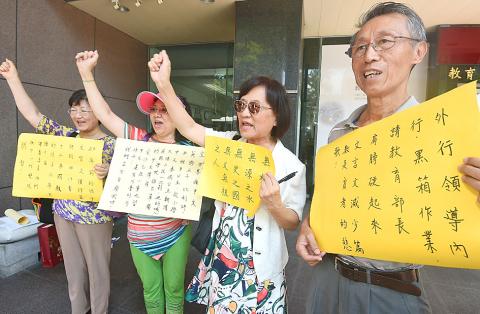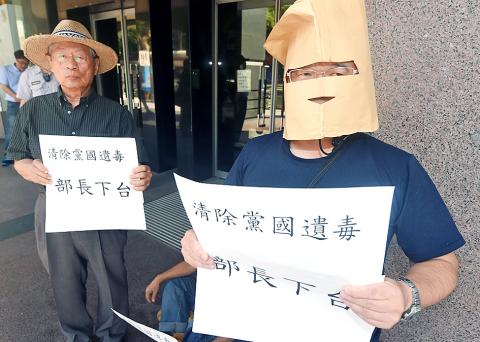The Ministry of Education’s curriculum review committee yesterday voted to reduce the proportion of classical Chinese content in senior-high school curricula to between 35 percent and 45 percent.
The decision followed a meeting earlier yesterday, in which the committee voted to abolish a conclusion reached on Sept. 10 to set the proportion at between 45 and 55 percent.
Other proposals at the Sept. 10 meeting included the elimination of classical Chinese from curriculum guidelines; leaving the decision to teachers; decreasing the proportion to between 40 and 50 percent or 30 and 40 percent; and setting the content level at 30 percent.

Photo: Liao Chen-huei, Taipei Times
However, as no consensus could be reached, the committee at that meeting had opted for a proportion of 45 to 55 percent suggested by a National Academy for Educational Research committee.
That decision sparked criticism from high-school teachers and lawmakers, who said the procedures for the meeting were seriously flawed.
The current ratio of classical Chinese materials included in senior-high school curriculum guidelines is between 55 percent and 65 percent.

Photo: Liao Chen-huei, Taipei Times
The meeting yesterday morning, attended by 43 of 48 committee members, passed the motion to abolish the Sept. 10 decision 30-5.
In the afternoon session, at which only 42 members were present, the committee voted on the various proposals.
Of the six proposals voted on separately, the one to reduce the ratio to between 35 and 45 percent received 33 votes, followed by the proposal to reduce the ratio to between 40 percent and 50 percent with 15 votes.
As each member can vote three times, a runoff was held between those two proposals, with the plan to reduce the ration to between 35 and 45 percent receiving the most votes, the committee said.
The proposed change, which is expected to take effect in 2019, has elicited heated reactions from educators and the public.
Academics and students in favor of a greater reduction to the ratio have said the rote memorization of classical Chinese poetry fails to help students understand their significance, while excluding other forms of literature.
Those in favor of maintaining the ratio have argued that much of today’s spoken language is derived from ancient literature, so it would not be good if people used only plain language without knowledge of the classics.

SECURITY: As China is ‘reshaping’ Hong Kong’s population, Taiwan must raise the eligibility threshold for applications from Hong Kongers, Chiu Chui-cheng said When Hong Kong and Macau citizens apply for residency in Taiwan, it would be under a new category that includes a “national security observation period,” Mainland Affairs Council (MAC) Minister Chiu Chui-cheng (邱垂正) said yesterday. President William Lai (賴清德) on March 13 announced 17 strategies to counter China’s aggression toward Taiwan, including incorporating national security considerations into the review process for residency applications from Hong Kong and Macau citizens. The situation in Hong Kong is constantly changing, Chiu said to media yesterday on the sidelines of the Taipei Technology Run hosted by the Taipei Neihu Technology Park Development Association. With

CARROT AND STICK: While unrelenting in its military threats, China attracted nearly 40,000 Taiwanese to over 400 business events last year Nearly 40,000 Taiwanese last year joined industry events in China, such as conferences and trade fairs, supported by the Chinese government, a study showed yesterday, as Beijing ramps up a charm offensive toward Taipei alongside military pressure. China has long taken a carrot-and-stick approach to Taiwan, threatening it with the prospect of military action while reaching out to those it believes are amenable to Beijing’s point of view. Taiwanese security officials are wary of what they see as Beijing’s influence campaigns to sway public opinion after Taipei and Beijing gradually resumed travel links halted by the COVID-19 pandemic, but the scale of

A US Marine Corps regiment equipped with Naval Strike Missiles (NSM) is set to participate in the upcoming Balikatan 25 exercise in the Luzon Strait, marking the system’s first-ever deployment in the Philippines. US and Philippine officials have separately confirmed that the Navy Marine Expeditionary Ship Interdiction System (NMESIS) — the mobile launch platform for the Naval Strike Missile — would take part in the joint exercise. The missiles are being deployed to “a strategic first island chain chokepoint” in the waters between Taiwan proper and the Philippines, US-based Naval News reported. “The Luzon Strait and Bashi Channel represent a critical access

Pope Francis is be laid to rest on Saturday after lying in state for three days in St Peter’s Basilica, where the faithful are expected to flock to pay their respects to history’s first Latin American pontiff. The cardinals met yesterday in the Vatican’s synod hall to chart the next steps before a conclave begins to choose Francis’ successor, as condolences poured in from around the world. According to current norms, the conclave must begin between May 5 and 10. The cardinals set the funeral for Saturday at 10am in St Peter’s Square, to be celebrated by the dean of the College